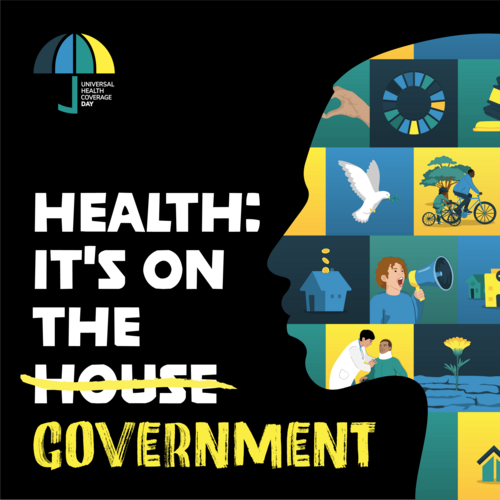UHC2030 hosted its annual UHC Day parliamentarian town hall to...
4 October 2024
UHC2030 and the Coalition of Partnerships for UHC and Global Health launched the 2024 UHC Day campaign with the theme Health: It’s on the government.

On 3 October 2024 UHC2030 and the Coalition of Partnerships for UHC and Global Health launched the 2024 Universal Health Coverage (UHC) Day campaign with a one-hour webinar focused on how reducing financial barriers to health services and protecting people from impoverishing health costs can accelerate progress towards health and well-being. The 2024 campaign theme, “Health: It’s on the government,” was announced to serve as a collective reminder to governments that UHC and financial protection for health is their responsibility and needs to be publicly financed.
Dr. Pamela Cipriano, co-chair of the UHC2030 Steering Committee, opened the webinar by emphasizing that over half of the world’s population, lacks access to essential health services. Furthermore, 2 billion people globally are experiencing financial hardship in accessing health services because they have to pay out of their own pocket for their health care. This must change; nobody should have to choose between health care and other essential needs like food, shelter or education. Greater financial protection for health must be a priority alongside access to services. She stressed that government investment in UHC not only protects individuals from impoverishing healthcare costs but also generates substantial economic and social benefits.
The webinar featured a panel discussion moderated by Dr. Githinji Gitahi, CEO of Amref Health Africa, and included a pre-recorded statement from Dr. Rajat Khosla, Executive Director of the Partnership for Maternal, Newborn, and Child Health (PMNCH). Dr. Khosla highlighted that reducing out-of-pocket healthcare costs is essential for realizing people’s right to health, particularly for women, children and adolescents. The live discussion brought together key global health leaders, including Dr. Michael Adekunle Charles, CEO of RBM Partnership to End Malaria, Dr. Angeli Achrekar, Deputy Executive Director of the Programme Branch for UNAIDS, and Ms. Alison Cox, Director of Policy and Advocacy at NCD Alliance.
The panelists emphasized that health is wealth, and it is an investment: money spent today is saved tomorrow. Making progress on UHC entails ensuring equitable access to healthcare, without poverty, stigma or discrimination. When governments invest in publicly funded financial protection schemes that guarantee everyone’s access to quality essential health services, they:
- Avoid short-, medium- and long-term costs in health spending,
- Reduce welfare losses, and
- Increase household savings and economic prosperity.
The panelists underscored that UHC and a greater focus on financial protection cannot be addressed from a country perspective alone. Government investment in health requires global financing restructuring and debt relief so that more domestic resources can be mobilized. They concluded the discussion by calling on leaders to use the existing roadmaps for investments in UHC and specific health areas to protect people from catastrophic out-of-pocket health spending s.
Following the panel discussion, UHC2030 presented the 2024 UHC Day campaign materials. These include:
- Campaign graphics with advocacy messages and calls to action for decision makers
- Ready-to-use social media posts
- A UHC advocacy letter template
Harjyot Khosa, the Regional External Relations Director of International Planned Parenthood Federation and a member of the Advisory Group of the Civil Society Engagement Mechanism for UHC2030, underscored the essential role advocates play in holding governments accountable to their commitments and the importance of having a unified voice and coordinated calls to action to make impactful change national UHC policies, programs and budgets. She emphasized that financial protection is critical for communities in the global south, reminding participants that many people are just one medical bill away from poverty.
In closing the event, Dr. Magda Robalo, co-chair of the UHC2030 Steering Committee, called on advocates to urge decision-makers, including Ministers of Health, Ministers of Finance and parliamentarians, to take bold actions to protect everyone – and particularly people in vulnerable and marginalized situations – from financial hardship and impoverishing health costs. She encouraged advocates to begin organizing their UHC Day campaign events using the materials presented, and to write letters to their government officials, stressing that collective action is crucial for meaningful progress.
More UHC2030 News
A global health financing emergency threatens progress toward...
UHC2030 at HSR2024: Advancing equity and inclusion in health systems through civil society knowledge
UHC2030, in collaboration with the SUPPORT-SYSTEMS research...
